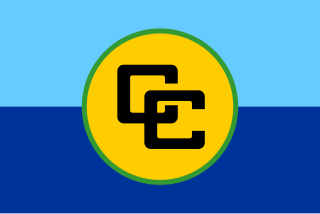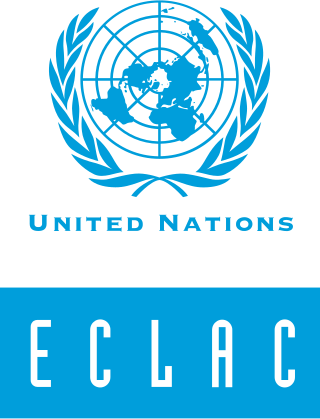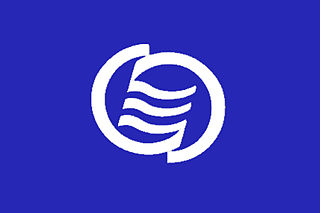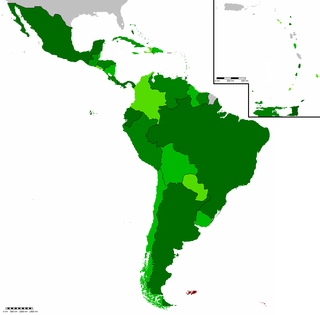Colombia seeks diplomatic and commercial relations with all countries, regardless of their ideologies or political or economic systems. For this reason, the Colombian economy is quite open, relying on international trade and following guidelines given by international law.

The Caribbean Community is an intergovernmental organisation that is a political and economic union of 15 member states throughout the Americas and Atlantic Ocean. They have primary objectives to promote economic integration and cooperation among its members, ensure that the benefits of integration are equitably shared, and coordinate foreign policy. The organisation was established in 1973, with its four founding members signing the Treaty of Chaguaramas. Its primary activities involve:

A regional Internet registry (RIR) is an organization that manages the allocation and registration of Internet number resources within a region of the world. Internet number resources include IP addresses and autonomous system (AS) numbers.

LACNIC is the regional Internet registry for the Latin American and Caribbean regions.

The Inter-American Development Bank is an international financial institution headquartered in Washington, D.C., United States of America, and serving as the largest source of development financing for Latin America and the Caribbean. Established in 1959, the IDB supports Latin American and Caribbean economic development, social development and regional integration by lending to governments and government agencies, including State corporations.

The United Nations Economic Commission for Latin America and the Caribbean, known as ECLAC, UNECLAC or in Spanish and Portuguese CEPAL, is a United Nations regional commission to encourage economic cooperation. ECLAC includes 46 member States, and 14 associate members which are various non-independent territories, associated island countries and a commonwealth in the Caribbean. ECLAC publishes statistics covering the countries of the region and makes cooperative agreements with nonprofit institutions. The headquarters of ECLAC is in Santiago, Chile.
The history of the Jews in Latin America began with conversos who joined the Spanish and Portuguese expeditions to the continents. The Alhambra Decree of 1492 led to the mass conversion of Spain's Jews to Catholicism and the expulsion of those who refused to do so. However, the vast majority of conversos never made it to the New World and remained in Spain slowly assimilating to the dominant Catholic culture. This was due to the requirement by Spain's Blood Statutes to provide written documentation of Old Christian lineage to travel to the New World. However, the first Jews came with the first expedition of Christopher Columbus, including Rodrigo de Triana and Luis De Torres.

The Association of Caribbean States is an advisory association of nations centered on the Caribbean Basin. It was formed with the aim of promoting consultation, cooperation, and concerted action among all the countries of the Caribbean coastal area. The primary purpose of the ACS is to promote greater trade between the nations, enhance transportation, develop sustainable tourism, and facilitate greater and more effective responses to local natural disasters.

The Inter-American Dialogue, also known as the Dialogue or IAD, is a U.S.-based think tank in the field of international affairs primarily related to the Western Hemisphere. Headquartered in Washington, D.C it intends to "foster democratic governance, prosperity, and social equity in Latin America and the Caribbean". The Dialogue's research areas focus on the rule of law, education, migration, remittances, energy, climate change and extractive industries.

The Audre Lorde Project is a Brooklyn, New York–based organization for LGBT people of color. The organization concentrates on community organizing and radical nonviolent activism around progressive issues within New York City, especially relating to LGBT communities, AIDS and HIV activism, pro-immigrant activism, prison reform and organizing among youth of color. It is named for the lesbian-feminist poet and activist Audre Lorde and was founded in 1994.

Caribbean Americans or West Indian Americans are Americans who trace their ancestry to the Caribbean. Caribbean Americans are a multi-ethnic and multi-racial group that trace their ancestry further in time mostly to Africa, as well as Asia, the Indigenous peoples of the Americas, and to Europe. As of 2016, about 13 million — about 4% of the total U.S. population — have Caribbean ancestry.

Haiti has a sizeable diaspora, present primarily in the United States, Panama, Dominican Republic, Cuba, Canada, France, the Bahamas, Peru, Ecuador, Colombia, Brazil and Chile. They also live in other countries like Costa Rica, Mexico, Bolivia, Guatemala, Nicaragua, Honduras, Venezuela, Argentina, Barbados, Guyana, Belgium, Switzerland, Turks and Caicos, among others.

The League of United Latin American Citizens (LULAC) is the largest and oldest Hispanic and Latin-American civil rights organization in the United States. It was established on February 17, 1929, in Corpus Christi, Texas, largely by Hispanics returning from World War I who sought to end ethnic discrimination against Latinos in the United States. The goal of LULAC is to advance the economic condition, educational attainment, political influence, housing, health, and civil rights of Hispanic people in the United States. LULAC uses nationwide councils and group community organizations to achieve all these goals. LULAC has about 132,000 members in the United States.

The Community of Latin American and Caribbean States (CELAC) is a regional bloc of Latin American and Caribbean states proposed on February 23, 2010, at the Rio Group–Caribbean Community Unity Summit, and created on December 3, 2011, in Caracas, Venezuela, with the signing of the Declaration of Caracas. It consists of 33 countries in Latin America and the Caribbean and has five official languages.
Guyanese Americans are American people with Guyanese ancestry or immigrants who were born in Guyana. Guyana is home to people of many different national, ethnic and religious origins. As of 2019, there are 231,649 Guyanese Americans currently living in the United States. The majority of Guyanese live in New York City – some 140,000 – making them the fifth-largest foreign-born population in the city.
Caribbean immigration to New York City has been prevalent since the late 19th and the early 20th centuries. This immigration wave has seen large numbers of people from Jamaica, Haiti, Cuba, Dominican Republic, Antigua and Barbuda, Guyana, and Trinidad and Tobago, among others, come to New York City in the 20th and 21st centuries. Caribbeans are concentrated in the Bronx, from 211th Street to 241st Street and Gun Hill Road. There are also Caribbean communities in Brooklyn, especially in the neighborhoods of Flatbush and Prospect Heights.

Large-scale Chinese immigration to Puerto Rico and the Caribbean began during the 19th century. Chinese immigrants had to face different obstacles that prohibited or restricted their entry in Puerto Rico.

Islam is a minority religion in all of the countries and territories of the Americas, around 1% of North America population are Muslims, and 0.1% of Latin America and Caribbean population are Muslims.
The History of the Jews in Colombia begins in the Spanish colonial period with the arrival of the first Jews during the Spanish colonization of the Americas.
The Black Power Movement in Montreal in the 1960s was a period of rediscovering black identity through a process of invoking cultural, economic, and political thought amongst blacks. The eruption of political activism during Montreal's Quiet Revolution as well as the reformation of immigration policies which discriminated against non-white immigrants allowed black communities to publicly express and bring awareness to their struggles with racism. The movement was an integral component of the emerging global challenges to imperialism during the 1960s, stemming from various movements including Garveyism, pan-Africanism, the Harlem Renaissance, Rastafari, and others. Montreal's Black Power movement culminated in the aftermath of the Sir George Williams Affair—a student occupation that resulted in an estimated $2 million worth of damages and 97 arrests—which raised concerns of racism worldwide.













